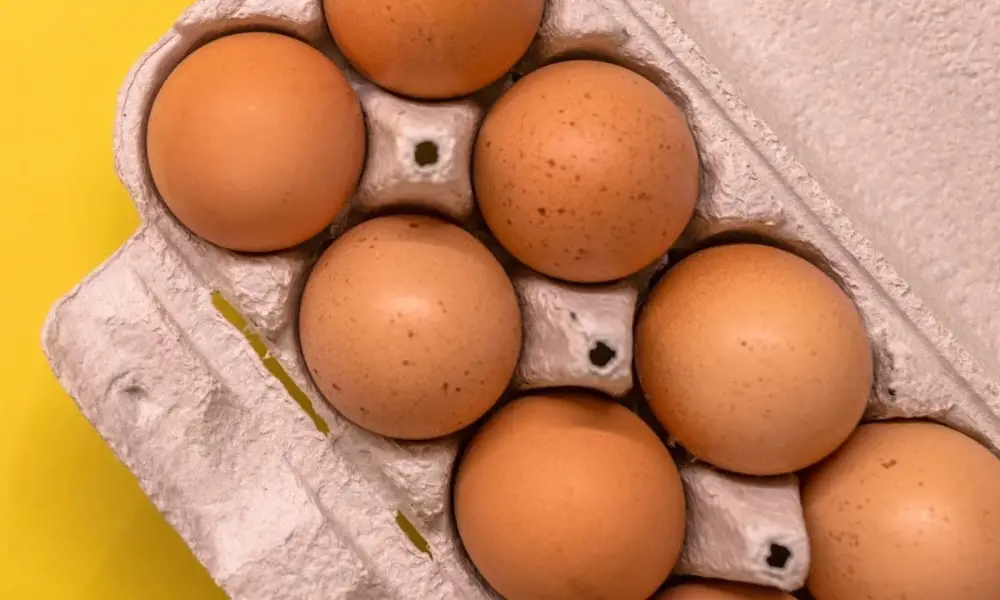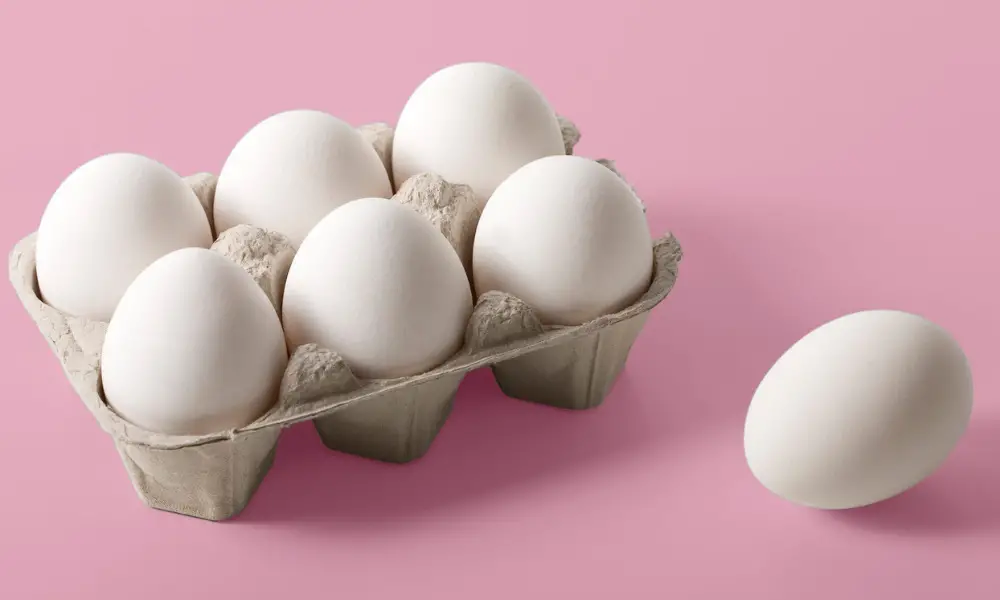Eggs are a very versatile item that is used in everything from birthday cakes to breakfast meals. Those who frequently use eggs in their cooking are aware of how crucial it is to utilize them when they are at their best, yet it can be difficult to keep unused eggs fresh. Knowing how to properly store eggs will be helpful whether you just bought them at the supermarket or from a chicken. The best approach to preserve eggs is to crack, separate, and freeze them in airtight containers, or to keep them in their original carton on a shelf front and center in a cold refrigerator.

What are Eggs?
An egg is described in the dictionary as a round or oval item laid by a female fish, bird, reptile, or amphibian. The exterior covering (or shell) of this spherical structure, which often contains an embryo in development, maybe chalky or leathery.
There are other sorts of eggs, but as chicken eggs are the most frequently used in cooking, I will just include them in this post. Indeed, chicken eggs are a significant source of protein and fat and are obtained from chickens. Due to its high concentration of lipids, carotenoid colors, and minerals, the yolk, which comprises one-third of the entire egg, is more nutrient-dense.
Although the exact date that humans began eating chicken eggs is uncertain, it is thought that it happened between 7000 and 8000 years ago, not long after chickens were domesticated.
How to Store Eggs Properly
Refrigerating Eggs
The eggs should remain in their original carton. The ideal place for your eggs to stay in storage is in the container they arrive in when you initially purchase them. The eggshells can’t pick up smells from the other goods in the refrigerator because of the composite material of the carton. Additionally, it prevents them from being crushed or broken by keeping them carefully separated and covered.
The egg sections in built-in refrigerators frequently force you to drop all of your eggs unguarded, which can result in large messes and wasted eggs.
Additionally, by keeping the eggs in their original carton, you may keep the expiration date easily accessible.
Place the large end of the eggs up. For this reason, eggs are placed in cartons with the bulbous end on top. This prevents the yolk from breaking by keeping it in the center of the egg. When employed in various recipes, a balanced, undamaged yolk tastes fresher and produces superior outcomes.
Eggs should not be moved or repositioned too frequently because doing so could harm the yolk or the natural air pockets inside.
The eggs should be kept in the refrigerator on the top shelf. A lot of people believe that keeping their eggs hidden on the inside of the door is more practical. However, because it enables them to keep a more constant temperature, the refrigerator’s main body is better for storing eggs. Keep your eggs at a temperature of about 40 degrees F to prolong their vitality.
The temperature variations around the refrigerator door happen more quickly when it is often opened and closed.
While it’s possible to store raw, recently laid eggs at room temperature, processed eggs should always be kept in the refrigerator.
Eggs Removed from the Shell and Freeze
Divvy up the whites and yolks. The egg whites should be placed in an airtight freezer-safe container after being cracked and frozen. Sift the yolks out and put them in another container. When cracking and sifting the eggs, take care not to crack the yolks.
Refrigerate separated egg yolks in a dish of cold water to keep them safe.
It will be simpler to use the white and yolks as needed in cooking projects if they are stored separately.
Combined egg beating Alternatively, you can freeze whole eggs without having to first separate them. The eggs should simply be whipped until fully incorporated before being placed in the freezer. Whole eggs can typically stay fresh for up to a year when properly frozen.
Eggs can be stored more efficiently by being frozen intact.
Add a dash of salt or sugar. When frozen, egg yolks have a propensity to solidify into a thick gel. By incorporating a small bit of salt or sugar, which will prevent the yolks from congealing, you can prevent this. The proteins in egg yolks are more difficult to connect with and solidify under low temperatures because of these additions.
Typically, for every 14 cups of eggs, you should aim to add roughly 18 teaspoons of salt and 1 12 teaspoons of sugar (about four large eggs).
For eggs that will be used in savory recipes, use salt, while for those that will be used in desserts and other sweet treats, use sugar.
In an airtight container, freeze. As stated previously, the container you select for freezing eggs needs to have a lid that completely seals the container. If not, moisture could leak into or out of the container and potentially destroy the eggs. It will be preferable to use a lidded Tupperware or comparable container for this.
You can split the yolks or white into a standard ice cube tray if you chance to be out of extra storage containers.
It’s not a good idea to use freezer bags because they can quickly rupture and make a mess. If you must use a freezer bag, ensure sure it is well closed and that all extra air has been squeezed out before sealing it.
How to Tell If Your Eggs Are Still Good?
Be wary of eggs that smell bad. Taking a sniff is the simplest way to determine whether a package of eggs has gone rotten. Eggs that are past their expiration date will eventually start to smell strongly of sulfur. If you don’t notice anything unsettling, there’s a strong likelihood that your eggs are fine because this smell is impossible to ignore.
Fresh eggs should have no real smell of any kind.
To stop the odor from permeating your entire house, dispose of rotting eggs in the garbage disposal rather than the trash.
Observe any cloudy whites. Once the egg has been cracked, observe how the white and yolk are doing. Young egg whites should appear somewhat milky since they contain a lot of natural protein. The egg white will become crystal transparent as it ages and starts to degrade and may even become thin and soupy.
While they don’t always indicate freshness, clear whites of an egg can be a sign of quality.
Eggs with watery whites should not be used for cooking since they have a harder time holding things together.
Verify the yolk’s consistency. Solid, unbroken egg yolk with a deep golden-yellow hue will be considered healthy. On the other hand, the yolks of poor eggs are usually invariably flat, uneven, or readily punctured. The egg is clearly past its prime if the yolks appear dull.
Fresh eggs from chickens raised on pasture frequently have big yolks that are a darker orange hue and occupy more space inside the egg.
Check to see if the egg floats by placing it in a dish of water. A tried-and-true technique for determining the quality of suspect eggs is to immerse them in a few inches of water. Fresh eggs will immediately sink to the bottom of the bowl.
You could be better off buying another batch if it bobs to the surface or hovers close to the water’s edge.
Older eggs will float because of an internal gas buildup caused by the deterioration of their shells.
You can determine whether your eggs are still good without cracking them by using the float test.
Reference: A Case of Nice Fresh Eggs
Is It True That People With Diabetes Can Benefit From Eggs?
Eggs are a low-glycemic, high-protein food with a low carbohydrate content. As a result, they are an excellent protein source for diabetics.
Eggs are good for diabetes, according to the American Diabetes Association (ADA). A food’s blood sugar levels are negatively impacted if it has a low glycemic index.
Some people might be concerned about the cholesterol content of eggs. However, researchers believe that consuming eggs in moderation has no negative effects on cholesterol levels.
We’ll examine the advantages of eating eggs for people with diabetes in this article. We also discuss any possible risks and how to properly consume eggs if you have diabetes.
How Long Will Eggs Remain Fresh?
The FDA advises using eggs within three weeks of purchase to ensure the best quality. However, Donovan has a slightly longer shelf life—six weeks in the fridge for farm-fresh eggs and four weeks for eggs purchased at the supermarket. Store-bought eggs will be older due to shipment, she observes, explaining the shorter shelf life.
Donovan claims that if you use eggs from your own chickens, they can last for up to two weeks if they aren’t refrigerated and are just placed unwashed on your kitchen counter. For the duration of their shelf life, eggs must be kept in lower temperatures after being rinsed (which is only necessary if the eggs are covered with dirt or chicken poop). Based on some agricultural science Donovan says that when eggs are laid, a protective layer known as the bloom is placed on them. Bacteria cannot enter eggs because they are porous, according to the researcher. However, when the bloom has been removed, eggs must be chilled to ensure their safety.
Name Some Recipes that Use Eggs.
In addition to their many health advantages, eggs also serve other purposes in cooking, including increasing the flavor and color of custard and cakes and stabilizing emulsions. They are also used as a covering in recipes for croquettes. Most baking recipes typically use the protein in eggs as a binding ingredient. It is acceptable to say that the egg acts as a sort of glue to hold everything together.
Eggs don’t have a particularly strong flavor; some people even describe them as bland. But it also brings out other tastes.
The dishes with eggs are listed below.
Deviled pimento cheese eggs
Hash made with roasted peppers and potatoes
cheesy frittata with shallots and spring greens
Pasta salad, Deviled eggs, and croque monsieurs
Deep-dish quiche with bacon and lee
Lemon curd with strawberry crepes
Conclusion
You may be wondering how to store eggs so that they stay fresh and tasty. The first step is to keep them in the refrigerator. Once you do that, you should bring them to room temperature before using them. If you do not do that, your eggs will not last as long. However, if you are pressed for time, you can just peel and use them right out of the carton. However, to preserve the best freshness of your eggs, you should store them in their original carton. This will protect them from bacteria and keep them fresh for longer.
